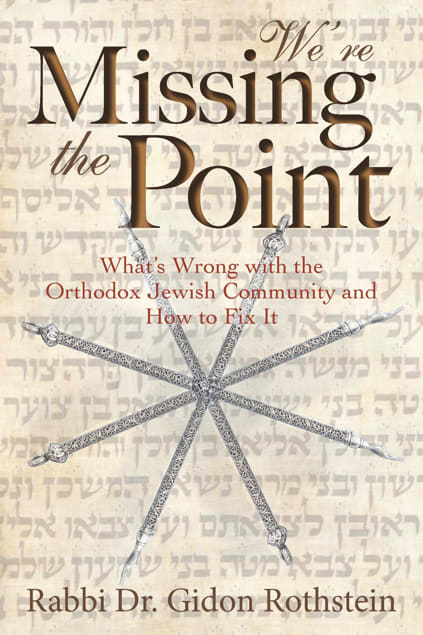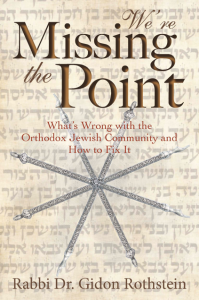We’re Missing the Point: What’s Wrong with the Orthodox Jewish Community and How to Fix It
Rabbi Dr. Gidon Rothstein. OU Press/ Ktav, 252 pages
In this comprehensive and articulate treatise on the state of contemporary orthodox Judaism, Rabbi Rothstein courageously addresses the question of whether, despite all the focus on the minutiae of Jewish law and a theoretical commitment to complete Torah devotion, observant Jews are nonetheless falling woefully short of connecting with God on any level of significance. His quest is to convince readers to reassess the nature of their relationship with God, to realize that more than anything else, He desires an intimate relationship with the Jewish people. This is expressed not only through strict adherence to halacha, but also, and especially, through mindful connectedness and constant faith that all things emanate from His Will.
Rothstein’s claim that “we do not even realize the basic parameters of what it means to serve God,” while quite bold and certainly controversial, is based upon years of experience and study, and is sufficiently borne out by the evidence he offers to give pause to even his most ardent challengers. He enlists the aid of texts from the Bible, the Talmud, as well as theological or halachic claims accepted “by virtually all traditional thinkers.” Instead of simply taking mitzvot at face value and observing them because halacha mandates that we must, Rothstein maintains that we must go a step further in attempting to extrapolate the deeper, more faith-based purpose of the commandments and uncover Judaism’s essential theological concepts of belief (which he lays out clearly here).
How many Orthodox Jews, asks Rothstein, think about the Exodus daily or fundamentally believe that God exists? The numerous stories he shares (as well as stories each of us surely has) underscores the extent to which “believing Jews” struggle with the basic tenets of our faith. With modern society’s acceptance of many of the concepts Torah Judaism abhors, today’s Jews, influenced by the social, political, and scientific climate, Rothstein asserts, are either swayed or find difficulty with Jewish law.
To remedy this, Rothstein covers a broad array of topics, including the importance of Haazinu and Shema; the meaning behind the Torah’s death penalty prohibitions; Noahide laws and how they are not intuitive; Shabbat and Its Concern with Positive Rest; and Autonomy as a Key to Understanding Women’s Lesser Obligation in Mitzvot. These chapters, and others, grapple with important issues and offer substantive conclusions that will fundamentally change our outlook on mitzvot and faith in a positive and meaningful way, while fully maintaining the integrity of the halachic system.
Within each chapter, Rabbi Rothstein shares anecdotal stories to keep readers focused. His fear that readers will put down the book before its conclusion leads to short chapters and an attention to brevity.
Perhaps most important, Rabbi Rothstein asserts that there is much room for personal autonomy within halacha and Jewish life. He concludes with practical changes we can make in our schools and synagogues, especially the ubiquitous issue of talking during prayer.
If we can accept that Judaism mandates certain basic concepts that must always be at the forefront of a Jew’s mind (i.e. there are no actions without consequences, death is not the end, G-d gave the Law at Sinai) and internalize them into our daily lives, then, Rothstein believes, our lives as Jews can be satisfying, compelling, and most important, completely rooted in a meaningful relationship with our Creator.
For more details and to purchase Rabbi Rothstein’s book, please visit: http://www.ou.org/oupress/item/were_missing_the_point.
The words of this author reflect his/her own opinions and do not necessarily represent the official position of the Orthodox Union.

